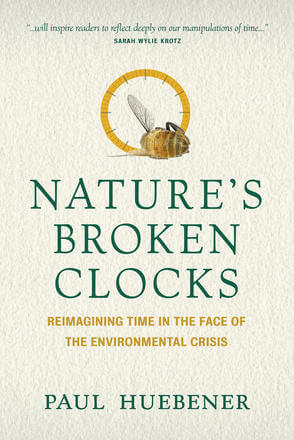AU professor explores time and the environment in new book
A new book by Athabasca University (AU) associate professor, Dr. Paul Huebener, aims to examine the critical junction between time and the environment. Nature’s Broken Clocks mixes history and science to understand various aspects of time and adds in literature to build on those ideas.

The ways we talk about time and the environment—what we understand about it, what kinds of stories we tell—helped create the backbone for how Nature’s Broken Clocks was organized. Instead of chapters, Huebener divides the book into five clocks, using five different examples to structure the way that we think about approaching time every day. For example, the first clock looks at the Earth itself and how the sun rising and setting helped us orient ourselves in time and now is translated through mechanical clocks.
“The way that we measure time as a society is closely connected to the natural environment. But cultural forms of time can give us the sense that we exist independently from the natural world. We’re not independent of the natural world, we’re closely connected to ecosystems all the time,” says Huebener when describing the first clock.
Huebener notes that reading thoughtful works of literature can change the way we understand how time works in both society and the environment. Nature’s Broken Clocks uses examples from literature, poetry, and television ads to achieve its primary goal of helping people develop a critical literacy of time. Examining and understanding time—for example, the way that we talk about time, or experience time—has really big consequences for how we interact with each other, how we feel about our own lives, what we value, and how this can help us see the world in new ways.
“In the era of climate change and ecological collapse, the everyday narratives we use to understand time are more important than ever, but our visions of time are often not quite in working order. We have trouble grasping the slow sequence of events between carbon emissions and the resulting heat, yet we also cannot cope with shockingly fast climate disasters. We think of nature in terms of slow sunsets and mountains, but our ecosystem is also characterized by viruses on jet planes. We go about our daily work as though electric lights and always-connected smartphones make the setting of the sun irrelevant, yet our bodies crave nightly darkness and sleep. Our cultural vision of time is a heap of broken clocks.”
– Excerpt from Nature's Broken Clocks by Paul Huebener
The School of Journalism at Carleton University recently interviewed Paul Huebener about the politics of time. The interview can be heard at the 9:40 mark.
Get Nature's Broken Clocks!
Are you interested in Nature’s Broken Clocks? You can order a copy of the book through the University of Regina Press website or your local bookseller. It has also been featured on CBC Daybreak’s pandemic reading list and reviewed by Angie Abdou for CBC Daybreak, which you can listen to here. The book was also reviewed by the Literary Review of Canada available here for further reading.
Huebener teaches English courses at AU in the Faculty of Humanities and Social Sciences, and you can learn more about AU’s Bachelor of Arts in English program by visiting the department page.